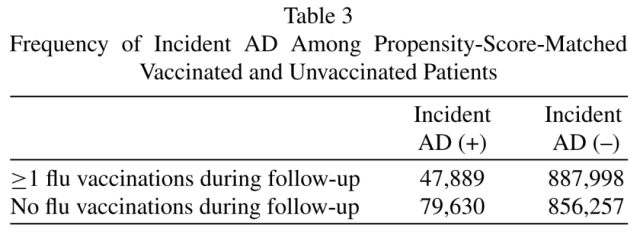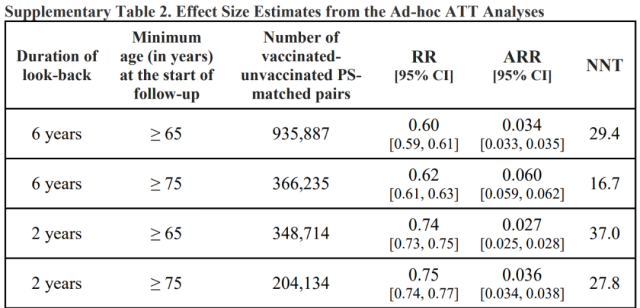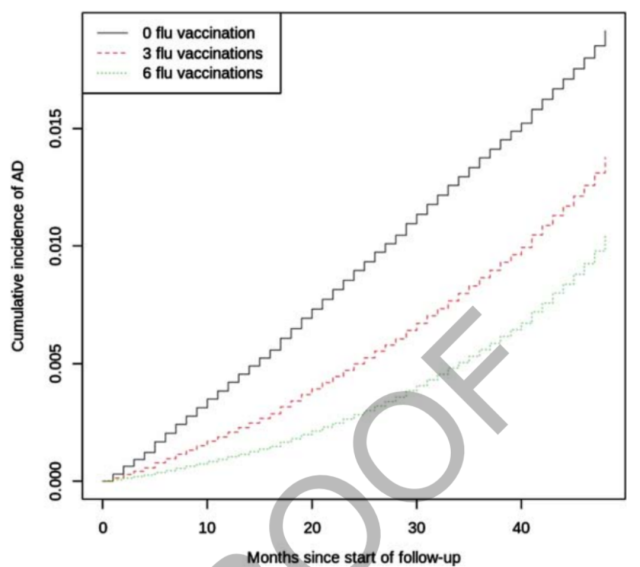Does the flu vaccine prevent Alzheimer’s disease?
- Normal Liver Cells Found to Promote Cancer Metastasis to the Liver
- Nearly 80% Complete Remission: Breakthrough in ADC Anti-Tumor Treatment
- Vaccination Against Common Diseases May Prevent Dementia!
- New Alzheimer’s Disease (AD) Diagnosis and Staging Criteria
- Breakthrough in Alzheimer’s Disease: New Nasal Spray Halts Cognitive Decline by Targeting Toxic Protein
- Can the Tap Water at the Paris Olympics be Drunk Directly?
Does the flu vaccine prevent Alzheimer’s disease?
- Should China be held legally responsible for the US’s $18 trillion COVID losses?
- CT Radiation Exposure Linked to Blood Cancer in Children and Adolescents
- FDA has mandated a top-level black box warning for all marketed CAR-T therapies
- Can people with high blood pressure eat peanuts?
- What is the difference between dopamine and dobutamine?
- How long can the patient live after heart stent surgery?
Does the flu vaccine prevent Alzheimer’s disease?! Nearly 2 million people study shows that flu vaccination is associated with 40% lower risk of AD in people over 65 years old.
Recently, Avram S. Bukhbinder and others from the University of Texas Health Sciences Center at Houston (UT Health) published important research results in the Journal of Alzheimer’s Disease .
Based on data from approximately 2 million subjects, they found that for people over 65 in the U.S., receiving at least one dose of the flu vaccine was associated with a 40 percent lower risk new-onset AD over a 4-year follow-up period , compared with no flu vaccine. % about [1]!
Substantial evidence suggests that systemic immune responses can influence AD risk and disease progression [2-3].
In addition, multiple microbial infections are associated with cognitive decline, such as respiratory infections, herpes infections, gastrointestinal infections, and even COVID-19, especially in older adults [4-7].
Perhaps, preventing the immune inflammatory response associated with microbial infection can reduce the risk of neurodegenerative disease?
Studies have shown that multiple vaccinations are strongly associated with a reduced risk of dementia, with previously reported vaccines including tetanus, diphtheria, pertussis, polio, tuberculosis, shingles, and influenza [4,8-10].
Although influenza vaccines are already listed, previous studies on their correlation with AD risk were limited by small samples, and the included population was highly homogenous and could not represent the general population.
As a result, Bukhbinder et al. wanted to conduct a large sample study of people over the age of 65 in the United States.
What a large sample study needs is people, and it needs to be many, many people.
Where to find so many people? The researchers had a flash of inspiration and set their sights on the Optum Clinformatics Data Mart (CDM), a large-scale commercial insurance claims database.
After all, CDM is full of gold, including a large number of people’s medical claims, drug claims and other information.
The researchers reviewed 10-year data in the CDM from 2009 to 2019. Taking September 1, 2015 as the node, the 10-year period was divided into a 6-year retrospective period and a 4-year follow-up period.
Subjects with at least 1 and 2 medical records with ICD (International Classification of Diseases) codes during the look-back period and follow-up period, respectively, were included in the analysis.
Of course, if the subject was under 65 years of age at the start of the 4-year follow-up period, or had a diagnosis of mild cognitive impairment, encephalopathy, dementia of any cause, or used AD-related medication during the 6-year retrospective period, the Excluded.
Ultimately, 1,185,611 vaccinated (≥1 dose) and 1,170,868 unvaccinated were included based on influenza vaccination during follow-up. Of course, the vaccination during the follow-up period must be before [AD onset/censoring/end of follow-up period], whichever occurs earliest among the three.
With the data in hand, it is time to unravel the true effect of the flu vaccine on the risk of new-onset AD. By Propensity Score Matching (PSM), 935,887 sample pairs (influenza vaccinated + influenza unvaccinated) were generated from 2,356,479 subjects.
During the 4-year follow-up period, AD was newly diagnosed in 5.1% (n = 47,889) of influenza vaccine recipients and 8.5% (n = 79,630) of influenza non-vaccinated individuals ; relative risk (RR) 0.60 (95%) CI, 0.59-0.61), absolute risk reduction (ARR) was 0.034 (95% CI, 0.033-0.035), and Number Needed to Treat (NNT) was 29.4.
This means that for people over the age of 65 in the United States, at least one dose of the flu vaccine was associated with a 40% lower risk of new-onset AD compared with no flu vaccine. In addition, for every 29.4 older adults vaccinated against influenza, 1 will be protected from new-onset AD.

The incidence of Alzheimer’s disease is still much higher in people who have not been vaccinated against influenza
Adjusting the lookback period, or changing the age requirement during the follow-up period had some impact on RR, ARR, and NNT.
When the look-back period remained unchanged at 6 years, but the ARR was significantly increased at the beginning of the follow-up period when the age was older than 75 years, it can be seen that the cognitive protection of influenza vaccination for the elderly over 75 years old seems to be more obvious.

Adjusting the lookback period time does not seem to change the effect of age in the follow-up period~
In the secondary analysis, the researchers counted the number of flu vaccinations the subjects had received during a 6-year lookback period.
They used a Time-to-event model to assess the effect of back-dated influenza vaccination doses on the cumulative incidence of Alzheimer’s disease, and the results were as expected.
The results showed that influenza vaccination in older adults was associated with a reduced risk of new-onset Alzheimer’s disease, and the strength of this cognitive protective effect was positively associated with the number of influenza vaccinations.
In other words, those who continued to receive the annual flu vaccine had the lowest risk of Alzheimer’s disease.

The more flu vaccine doses, the lower the cumulative risk of Alzheimer’s disease
Regarding the mechanism behind this phenomenon, Schulz of the University of Texas McGovern School of Medicine said: ” There is evidence that multiple vaccines can protect against Alzheimer’s disease, so we think this may not be a specific effect of the flu vaccine. The corresponding author of this paper, Bukhbinder, said with emotion: “Whether there is a similar relationship between COVID-19 vaccination and the risk of Alzheimer’s disease is also worth exploring.”[11]
All in all, based on a large sample study of people over the age of 65 in the United States, it is not difficult to find that influenza vaccination seems to be of great benefit to the prevention of “the most difficult” Alzheimer’s disease~
References:
[1]Bukhbinder AS, Ling Y, Hasan O, et al. Risk of Alzheimer’s Disease Following Influenza Vaccination: A Claims-Based Cohort Study Using Propensity Score Matching [published online aheAD of print, 2022 Jun 13]. J Alzheimers Dis. 2022 ;10.3233/JAD-220361. doi:10.3233/JAD-220361.
[2]Webers A, Heneka MT, Gleeson PA. The role of innate immune responses and neuroinflammation in amyloid accumulation and progression of Alzheimer’s disease. Immunol Cell Biol. 2020;98(1):28-41. doi:10.1111/imcb. 12301.
[3] Muzambi R, Bhaskaran K, Smeeth L, Brayne C, Chaturvedi N, Warren-Gash C. Assessment of common infections and incident dementia using UK primary and secondary care data: a historical cohort study. Lancet Healthy Longev. 2021;2 (7): e426-e435. doi: 10.1016/S2666-7568(21)00118-5.
[4] Scherrer JF, Salas J, Wiemken TL, Hoft DF, Jacobs C, Morley JE. Impact of herpes zoster vaccination on incident dementia: A retrospective study in two patient cohorts. PLoS One. 2021;16(11):e0257405. Published 2021 Nov 17. doi:10.1371/journal.pone.0257405.
[5]Ou YN, Zhu JX, Hou XH, et al. Associations of Infectious Agents with Alzheimer’s Disease: A Systematic Review and Meta-Analysis. J Alzheimers Dis. 2020;75(1):299-309. doi:10.3233/ JAD-191337.
[6] Fink A, Doblhammer G, Tamgüney G. Recurring Gastrointestinal Infections Increase the Risk of Dementia. J Alzheimers Dis. 2021;84(2):797-806. doi:10.3233/JAD-210316.
[7] Taquet M, Geddes JR, Husain M, Luciano S, Harrison PJ. 6-month neurological and psychiatric outcomes in 236 379 survivors of COVID-19: a retrospective cohort study using electronic health records. Lancet Psychiatry. 2021;8( 5): 416-427. doi: 10.1016/S2215-0366(21)00084-5.
[8] Verreault R, Laurin D, Lindsay J, De Serres G. Past exposure to vaccines and subsequent risk of Alzheimer’s disease. CMAJ. 2001;165(11):1495-1498.
[9] Klinger D, Hill BL, Barda N, et al. BlADder Cancer Immunotherapy by BCG Is Associated with a Significantly Reduced Risk of Alzheimer’s Disease and Parkinson’s Disease. Vaccines (Basel). 2021;9(5):491. Published 2021 May 11. doi: 10.3390/vaccines9050491.
[10] Liu JC, Hsu YP, Kao PF, et al. Influenza Vaccination Reduces Dementia Risk in Chronic Kidney Disease Patients: A Population-Based Cohort Study. Medicine (Baltimore). 2016;95(9):e2868.doi:10.1097 /MD.0000000000002868.
[11] https://www.sciencedaily.com/releases/2022/06/220624123814.htm.
Does the flu vaccine prevent Alzheimer’s disease?
(source:internet, reference only)
Disclaimer of medicaltrend.org
Important Note: The information provided is for informational purposes only and should not be considered as medical advice.



